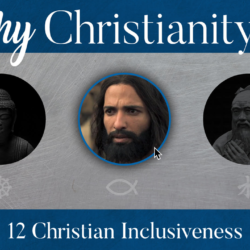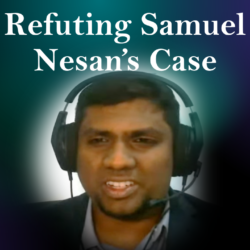This is part 2 of the Calvinism Debate
Just how fallen are we? What does it mean to be dead in trespasses and sins? Are we so depraved and mired in sin that we cannot even have faith in God? Blake Cortright says answers, “Yes.” Unless God quickens us through his spirit, we are innately unable and unwilling to reach up to him in faith. Jacob Rohrer says, “No.” Though we are fallen, we are still capable of responding to God’s call.
What Position Do You Think Won the Day?
- Total Depravity/Monergism (Blake) (50%, 8 Votes)
- Fallen but Can Have Faith/Synergism (Jacob) (38%, 6 Votes)
- Neither (13%, 2 Votes)
Total Voters: 16
—— Links ——
- Check out the other posts in this debate here
- More info about Jacob and Blake here
- See Jacob Roher’s interview on the gospel or watch his sermon, “How to Treat Other Christians.” His email is thekingdomgospel@outlook.com
- See Blake Cortright’s podcast on spiritual disciplines as well as how to quit pornography. Follow him on Twitter @blakecortright
- Intro music: Jazzy Frenchy by bensound.com. Licensed under Creative Commons: By Attribution 3.0 License.








This is a great debate over a serious topic that has caused so much hurt. I attended Calvinistic churches for several years and have seen how this affects people. Some use it to justify their sinful behavior, as being their nature. Others use it as a basis for shirking responsibilities because God has supposedly predetermined all things anyway. It also has an appearance of intellectuality that seems to attract so many.
Very briefly, here are some of my biggest objections:
1. Way too much is being read into the Greek word “phusei “, translated as “nature”. The word has a range of meanings, including “growth” or “sprouting”, which we would call our “up-bringing”. We are products of sinful upbringing, not born with a sin nature. A sin nature is not necessary in order to sin. Adam had no sin nature, yet chose to sin. We do sin naturally, just as Adam did, but not by an inherited nature that is in our genes or DNA.
2. Calvinists tend to not read texts in their context very well. (This is easy for all of us to do.) For example, Blake quoted Jeremiah 17:9 “The heart is deceitful above all things, and desperately wicked: who can know it?” as a proof text, which is a favorite of Calvinists. But the very next verse in my opinion refutes the intended use for a sin nature. It reads, “I the LORD search the heart, I try the reins, even to give every man according to his ways, and according to the fruit of his doings.” This shows that while others, and even ourselves, may not recognize the deceitfulness of our own heart (after all, we can choose to convince ourselves to believe a convenient lie), God still can see through our self-deception and knows the truth. So, God is holding us accountable for our thoughts and intents. Verse 10 shows that God does not recognize our heart’s deceitfulness as being an inherent nature, but rather a deliberate choice, even if we are not consciously aware that we have chosen wrong. Context is important!
3. Along with point 2 above, words used as analogies in texts are often given a more rigid meaning than they should. Being “dead in trespasses and sins” is a general description but should only be taken so far. Calvinists want the death here to be totally dead to fit their theology. But they forget to do this in other passages, such as Romans 6:6-7, “Knowing this, that our old man is crucified with him, that the body of sin might be destroyed, that henceforth we should not serve sin. For he that is dead is freed from sin.” Are followers of Christ who are “dead to sin” unable to sin? No. “Dead” is an analogy for what ought to be our condition toward sin, not what it really is. The same applies in Ephesians 2:1, where being “dead” is a general description of most of humanity due to their sinfulness, but this should not be pressed into meaning an inability to do otherwise, which is taking the analogy too far. God holds them accountable, because they do have a choice to live otherwise, but choose death instead.
That’s enough from me for now. God is good!
Hey Kevin, Thanks for your thoughts and thanks for listening!
I’ve got a few quick thoughts, but I’m in the midst of packing so I won’t pretend these are full fledged counter-arguments, rather some food for thought 🙂
First, I’d like to say that all the calvinists I know personally are not antinomians (anti-law), those who use their theology to justify their sinful actions and for shirking their responsibilities as Christians. I understand why this can happen, and there are pitfalls on the non-calvinist side too where folks can lean too far into legalism and even into works based salvation. In either case, I reject both legalism and antinomianism and I don’t hold it against either theological system that some who claim to believe a particular system practice legalism or antinomianism; that’s not a fair metric for the system as a whole.
As far as the “intellectuality,” I think the Bible can be studied and theology can be exegeted from the text as a whole – not setting one author against the other. I also think we have a reasonable faith and that God is not the author of confusion – so while I’m opposed to any chronological snobbery and/or intellectual superiority complexes, I don’t think that having a robust intellectual theology is a bad thing 🙂
To point 1:
Are you saying it’s possible that someone other than Jesus could have been born without sin and subsequently lived a sinless life? If not, at what point do people become sinners? At what point do they become guilty and in need of a savior? And what prompts this sin? See Robert Melvin’s comment below – he’s got a more expansive response to this point.
To point 2:
I wholeheartedly agree that context matters 🙂 and I would add that it’s a bit of a strawman argument to claim that “calvinists tend to not read texts in their context well” – some of the greatest theologians and bible scholars in church history have fallen on the Augustinian side of this issue (see Augustine, Luther, Calvin, Edwards, Spurgeon). I don’t see any inconsistency with taking verse 9 as a literal assessment of man’s nature and seeing the glory of God’s omniscience and justice of God in verse 10. Right before this verse is a juxtaposition of the righteous and the unrighteous, and after the blessed man is described, we get this explainer on the heart. Also, I never claimed that we aren’t held accountable, indeed, I believe that we are held accountable for our own actions – but without the grace of God, our actions would only be those of the one who “trusts in man, and makes his flesh his strength.”
3. The verses you referenced in Romans 6 follow the famous “what shall we say? Are we to continue in sin that grace may abound? May it never be!” section. But it’s also talking in very specific terms about “buried with him by baptism into death,” and then walking with him “in a death like his,” and then goes on to talk about no longer being a slave to sin. Of course regenerate people are capable of sin, and they sin every day. We won’t be fully freed from sin until we enter the Kingdom. I think this text is using a different metaphor since it’s tied specifically to baptism as a connection to Christ’s death.
Ephesians 2, on the other hand, appears to be describing the process of salvation itself – and how else would you describe “dead?” To quote the Princess Bride, would you say “he’s only MOSTLY dead?” First, Ephesians 2 is specifically addressing a group of regenerate people (the Ephesian church) and it’s using the second person.
“you were dead in trespasses and sin.” “among whom we all once lived…and were by nature children of wrath, like the rest of mankind.” And he doesn’t follow this by saying that “but you suddenly responded positively, or that you made the right choice”. Rather, “But God … made us alive together with Christ.”
Aside from describing our state apart from this grace, there’s nothing about our actions in this passage. Nothing about our decision to live one way or the other. Again, I agree that we are held accountable, but that isn’t the distinction given here for why God shows mercy. Indeed, “But God, being rich in mercy, because of the great love with which he loved us, even when we were dead in our trespasses, made us alive together with Christ.” He didn’t make us alive together with Christ because of, or after, something that we did. He made us alive when we were dead in sin.
That’s all I’ve got for now, I hope you enjoy the rest of the series – thanks again for listening in!
Hi Sean, this is a subject I have studied for a number of years. I want to point out two things about the Calvinist understanding of Eph. 2 and John 6. First, the concept of spiritual death is found nowhere in Scripture. It is merely read into passages like Eph.2. The result of Adam’s sin is never said to be spiritual death (you won’t find the term anywhere in Scripture) but simply death. All men die because of Adam’s sin, but all men will be raised back to life. Some will rise to live forever and some will rise to be judge and die a second death without any hope of ever having life again. Eph. 2:1-3 says nothing about all men being spiritually dead because of Adam’s sin, but that we are all on our way to the second death because of our own transgressions and sins. Paul uses the past tense “were dead” in the sense of doomed to death, just like in Rom. 8:10 “If Christ is in you your body is dead because of sin … ” The words “were by nature children of wrath” is not saying we were born under God’s wrath but describes the natural outgrowth of the kind of life he just described as being destined for wrath.
As for John 6:44 the meaning is not decided solely on the definition of the word, but by the context. Jesus explains what he means in the next verse i.e. to be drawn is to be taught by God. In v.66 he changes it to ” unless it is granted him by the Father.” No need to read a forceful compelling into it. So who does God draw or teach or grant this ability to come to Messiah. Not some imagined individuals who were pre-selected in eternity past, but rather those whose hearts had been prepared prior to Jesus’ coming on the scene. The words do not have application to all men of all ages, but to the Jews living at the time Messiah came, to those who heard him preach the kingdom of God. Not every Jew hearing Jesus and seeing his works would come to him as Messiah, only those who were taught by God. These are those who heeded the call of John the baptizer and repented. Why did John come first? “To make ready a people prepared for the Lord.” LK.1:16-17 We even have an example of how this worked in Matt. 16:16-17, when Peter confessed Jesus as Messiah, ” This was not revealed to you by flesh and blood but by my Father in heaven.”
Troy.
Psalm 51 makes it clear we are born with inherited sin. Children of iniquity. By nature children of wrath. To say it means we naturally progress into sin doesn’t align with any scripture nor historical orthodoxy. That’s a real stretch. Romans makes it very, very clear in chapters 3, 8 and 9 just where we stand before a holy and just God.
Regarding John 6, see also John 17, the high priestly prayer. It goes into great detail about the father granting the son a people, and praying only for those people, and keeping those people. It’s all Jesus, not us. This is not speaking specifically to the Jews alone in Jesus day. That’s confirmed all over scripture.
And trying to extrapolate the Paul didn’t mean dead when he says we were dead is also a stretch. But let’s say I give the to you. The scripture is also rich in saying we are slaves to sin, in bondage and chains to sin. How does one become free of bondage or slavery? By being set free, by someone other than themselves. Someone rescues them, not because of anything they did but because someone else did it for them.
Cheers and amen to all of you! Great work on the podcast. #teamblake
Hi Justin,
Psalm 51 says nothing about inherited sin. You are simply imposing that concept upon the text. I assume you are referring to v.5. This is David’s exaggerated, emotional, response to being confronted with his sin and perhaps for the first time since he committed the sin is feeling the full weight of guilt and is expressing disgust with himself hyperbolically. Balance this statement of David with an earlier psalm, before he had committed great sin against Yahweh, Psalm 18:20-24.
Again in John 17, you are simply reading Calvinist ideas into the text as if it has no historical setting. Those given to Messiah are the Jews who followed him while he was here in the flesh (see v. 12) i.e. his disciples, the remnant of true believers among the Jews of that day. Yes he prays for them and not the world (the unbelieving Jews), but his prayer is not for salvation but for protection from the evil one, and he prayers the same for those who in the future will believe on him. Be careful about reading your theology back into the text. Look carefully at what is being said.
If you can, show me one verse that unambiguously speaks of spiritual death or where the word death must bear the Calvinist meaning and no other possible meaning. Everywhere in Scripture from beginning to end real death is the penalty for our sins. This is what Jesus saves us from, not only the death we all will die because of Adam’s sin, but the death we will die (second death) for our own sins. You are the one who is not taking Paul seriously when he says death — he really means death i.e. the corruption and dissolution of our being, not some concept invented by Augustine.
Jesus said “everyone practicing sin is the slave of sin.” You are reading it as if he said “everyone is a slave of sin and therefore practices sin.” Was Noah practicing sin; how about Job or Abraham? Why does Scripture everywhere make a distinction between the righteous and the unrighteous, the godly and the ungodly, the just and the unjust, etc.
Of course we are all sinners and cannot save ourselves, but that we are incapable of even recognizing that fact and turning to God for mercy without regeneration is just not a Biblical idea.
What of Genesis 8:21? Or Psalm 51:5?
Or, one of my favorites: Romans 5: specifically 12-21.
Through the sin of Adam, all men were condemned. If all are condemned in Adam, what spark of innocence before God is there to be found, even in an infant?
Without Christ, there is no hope to be found. If it boils down to man’s ability to choose, why has no man, save Christ, ever been without sin?
What makes a child’s natural disposition selfish and self seeking? If it is not from conception, when, and by what means does sin enter a man? What causes a man to choose death, the wages of sin?
When even your thoughts can be counted against you (Mathew5:21-28, James 1:14-15), can you say when you first sinned?
Hi Robert,
Gen. 8:21 does not say that all men are evil from birth. It speaks of evil inclinations from youth. Follow that word youth through the OT and see it’s not talking about infants. The verse could and probably should read “Never again will I curse the ground because of man, even if every inclination of his heart is evil from his youth.
Blake, I totally agree with you that it is wrong to paint all Calvinists (or any group for that matter) with the same brush. I merely meant that using a sin nature as an excuse seems to be an unspoken attitude among many (but never admitted, and of course “many” does not include many others).
There is certainly nothing wrong with being a scholar. By intellectuality I am referring to a common tendency toward using Latin terms or complex sayings as if these pontifications are somehow weights in their favor, making them more right than others who refuse to communicate this way. But this is really off topic, and it can equally apply to both sides, so never mind. Maybe I should not have mentioned it here.
You referred me to Robert Melvin’s comment, which ironically illustrates my point. Robert says, “Psalm 51 makes it clear we are born with inherited sin.” No, that is how Calvinists read the passage in their minds. Ps. 51:5 says, “Behold, I was shapen IN iniquity; and IN sin did my mother conceive me.” “In” is not “with”, but “with” is what is taught by Calvinists. If David had said “with sin…” then he would be offering an excuse due to a design flaw, but “in sin…” refers to the environment, which is so conducive to sinning, as we are surrounded by sin. He therefore asks for mercy (verse 1). So, Psalm 51 to me does not at all make it clear that we are born with inherited sin. Inherited sin is isegesis, not exegesis.
You ask, “at what point do people become sinners? At what point do they become guilty and in need of a savior?” Genesis 8:21 says it is from their youth. Another good passage is Deut. 1:39, “Moreover your little ones, which ye said should be a prey, and your children, which in that day had no knowledge between good and evil, they shall go in thither, and unto them will I give it, and they shall possess it.” According to Moses, children have “no knowledge of good and evil.” Even the passage about the Messiah in Is. 7:14-16 has verses 15-16 stating, “Butter and honey shall he eat, that he may know to refuse the evil, and choose the good. For before the child shall know to refuse the evil, and choose the good, the land that thou abhorrest shall be forsaken of both her kings.” Even Jesus had to learn the difference between good and evil! The timeframe for when a child becomes aware and makes conscious choices for good will vary for each child. Only God knows that. They are born without sin, not with sin.
You ask, “And what prompts this sin?” James 1:14-15 answers this question: “each one is tempted when he is drawn away by his own desires and enticed. Then, when desire has conceived, it gives birth to sin; and sin, when it is full-grown, brings forth death.” This applied to Adam’s first sin, and it applies today. There is no need to invoke a “sin nature”.
We are in agreement that, as you stated, “the Bible can be studied and theology can be exegeted from the text as a whole.” The problem is that while Calvinists claim to have a systematic theology that takes all the applicable passages into consideration, they don’t. I have Wayne Grudem’s large volume of Systematic Theology which teaches the sin nature, but nowhere in the chapter about sin does he deal with the verses I have raised. He uses isegesis to make verses say “with” instead of “in” and uses other sloppy arguments. He should know better, but his students and readers often don’t, and end up with a distorted view of what the Bible actually says.
I’m looking forward to the future debate discussions.
Kevin…
I’m sorry but you’re straying pretty far from orthodox Christianity if you’re saying people aren’t naturally sinful but are just in a sinful environment. What causes the environment to be sinful? The people in it, because they are sinful. Paul makes that absolutely clear when he says NONE ARE GOOD. C’mon.
None are good – by choice, not by birth. If being human requires a sinful nature, then Jesus was not one of us. My goal is to be a biblical Christian, not an orthodox Christian.
I appreciate the attempt at modeling more Christian conversation over such a hot button issue, but for this to be a fair debate, the two views need to be presented in light of how they have been understood historically. As an Arminian, I did not feel that the presentation of the Arminian view represented classical Arminianism. The classical Arminian response to total depravity is not “spiritual death doesn’t imply that men can’t believe in God in their own power” – and to say otherwise borders on Pelagianism – instead, the classical view is that God meets us and seeks us out first and we have the ability to say no. The Arminian presenter did allude to God’s wooing or drawing us, but the brunt of his argument was that spiritual death doesn’t imply inability to seek God, and again I believe that’s closer to Pelagianism than Arminianism. I will continue to listen to this debate series but I don’t think this episode characterized the Arminian view well at all, and I’d suggest a re-record in the future.
If we are constantly being reminded that we are “undeserving worms” this begins to affect our self-image and sense of worthiness in a very destructive way. I find that it also tends to make us less compassionate towards others, as we have not been taught to recognize the unique value of each human being around us. It’s much easier to become frustrated and angry with people we come into contact with if we see them as “fundamentally sinful” or “hopeless wretches”. Some doctrinal backgrounds such as Calvinism teach that not everyone is invited to be saved by God’s grace (they somehow find a way to ignore very clear texts such as 2 Peter 3:9 and 1 Timothy 2:4), which can lead them to behave towards others in a very cold-hearted and judgemental way. I’m not implying that all Calvinists fall into this category as this would be a crass generalization, but it has been my experience that many of them end up with very twisted and unhealthy attitudes based on the fundamental “TULIP” doctrines.
Excellent conversation. I think it is very hard to get around the clear verses from the testimony of John the baptist.
John 3:36 “He that believes on the Son has everlasting life: and he that believes not the Son shall not see life; but the wrath of God stays on him”.
It is a human choice to believe and receive Jesus Christ…AND… it is also a choice to Not believe the Word of God through Jesus Christ.
Those of us who are preaching Christ Jesus, as we are filled with the holy Spirit, will have both hearers and mockers, as seen in the book of Acts.
Lord Jesus sheds more light on what is going on in the hears of men:
John3:19 “This is the judgment, that the Light has come into the world, and men loved the darkness rather than the Light, for their deeds were evil. 20 “For everyone who does evil hates the Light, and does not come to the Light for fear that his deeds will be exposed. 21 “But he who practices the truth comes to the Light, so that his deeds may be manifested as having been wrought in God.”
Yes, the Father’s Holy Spirit loving intervenes to “drag” or compel us to Christ, once we “hear” enough, because He wants none to perish. But, there must be a repentance!
The REPENT part of the gospel of God, in modern evangelism appears to be made optional. Thus, many do not realize the co-operation with God that is necessary to move on to genuine faith.
It is NOT “regeneration” that is a prerequisite to faith in Jesus Christ,,,but REPENTANCE IS.
Mark 1:14 “Now after John had been taken into custody, Jesus came into Galilee, preaching the gospel of God, 15 and saying, “The time is fulfilled, and the kingdom of God is at hand; repent and believe in the gospel.”
Without repentance, then the devil can surely steal the Word, as you counted God’s gospel…not from heaven, but nothing more than common bread crumbs.